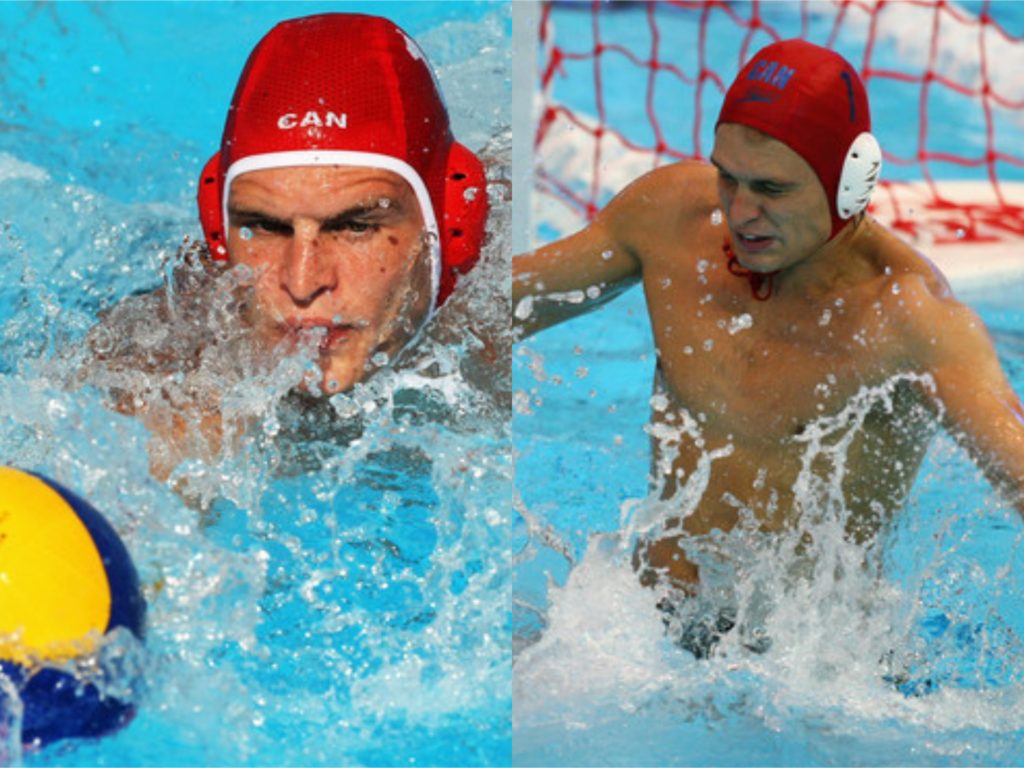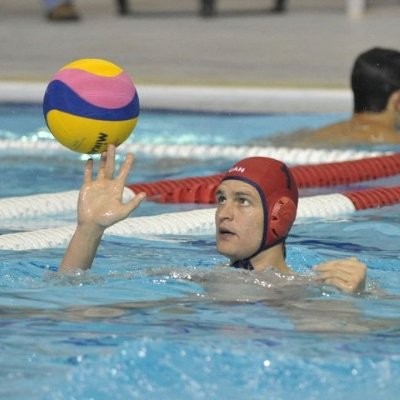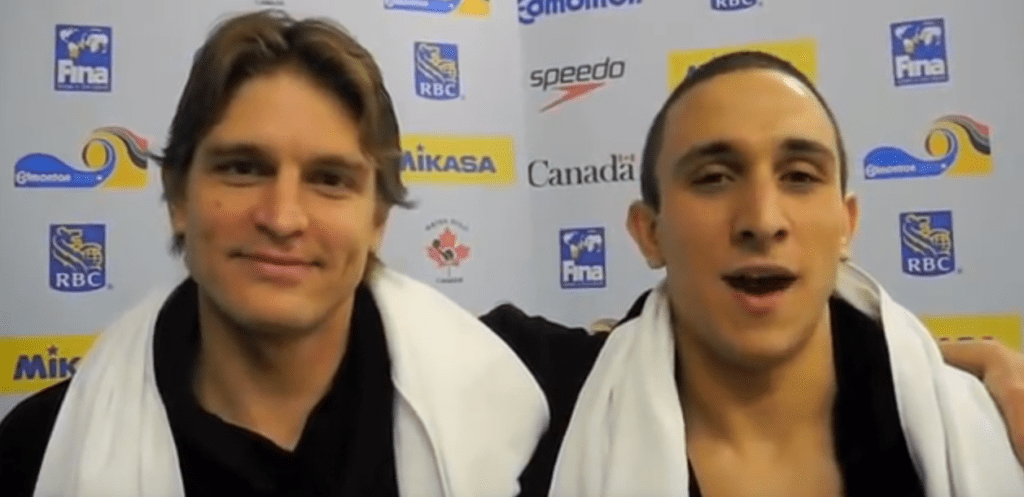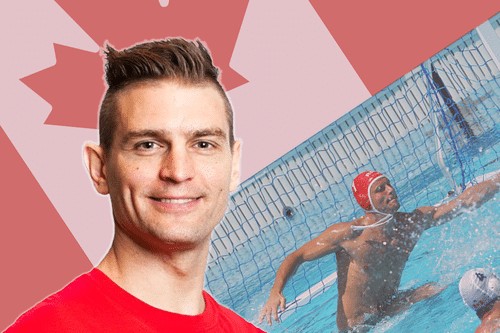I used to work with Water Polo Canada when I lived in Alberta and dealt with Robin Randall, who was at the time the manager for Canada’s senior men’s national water polo team. In fact, Robin’s collected 30 years of experience in the sport of water polo. For 20 years of those years, Robin’s been a high-performance athlete and team leader with Water Polo Canada. One of his most illustrious moments came when he was a member of the Canada men’s national water polo team when they won the bronze at the Rio Pan American Games in 2007.
While he is not technically working full-time in the sport industry at the moment, he was called upon to accompany the senior men’s national water polo team to Gwangju, South Korea, competing in the Gwangju 2019 FINA World Aquatic Championships. Robin also still does a lot of work for AthletesCAN, serving as a secretary on the executive board.
Fresh off his trip to South Korea, I was thrilled to work with Robin once again. This time on behalf of SPMA. We chatted about his career in sport as an athlete and staff member with Water Polo Canada, post on the Athletes’ Council and his future. Robin is someone I respect and admire. He has a tremendous story and shares some of it with us using his awesome sense of humour.

Please note: This interview was conducted via phone. Editing changes were made to make it easier to read while maintaining the essence of the interview.
You were an athlete, coach and manager with Water Polo Canada. Tell us about your career with the men’s national team.
I started playing water polo way back in 1987, and I made Canada’s youth national team in 1995. From there I made Canada’s junior national team, and while I was on the junior national team, I moved to the national training center. I lived and trained on and off a team for 20 years. I took a year sabbatical–by which I mean I got tired of it and bailed for a year–and then I came back. I played in Australia for three seasons, and in Spain for one.
When I was retired in 2016, I got a message from Justin. The manager was retiring and the goalie coach was moving to Toronto, and so he asked me if I wanted to do both of those jobs because he couldn’t think of a better goalie coach and he thought that I would be an okay candidate for the manager; a trainable candidate, I guess.
I did that for two years. As it turned out, I actually enjoyed the managing part a lot more than the coaching part. I was just a lot more satisfied with it. The coaching part was okay, but in my head coaching involves a huge degree of passion. Either I used up all of my passion playing, or I just wasn’t interested in doing all the things that it would take to get to a high level of coaching. But I really liked the opportunity; it was great to work with the athletes because they’re fantastic.

In my second year as the assistant coach and manager, I came out of retirement. I had to sit on the bench for world championships because there were some injuries. I was the flag bearer, I was back-up goaltender, I was manager, I was assistant coach, doing all the stuff. So that was interesting.
Then the year after that was the year of the move. I put everybody’s stuff into a truck and me and my dad drove it to Montreal. We dragged Brian’s car behind the 22-foot U-haul truck. That’s when I started working at Mount Royal University, just last September. And that’s my sojourn through Candian sports.
Was it difficult to transition from an athlete to a coach and manager? Did you always have that leadership side of you, as an athlete?
There was a time when I had a little bit of leadership in the locker room. Towards the end, it was like “He’s the oldest guy on the team.” People would respect my opinion, but I didn’t speak up much because I wasn’t the Captain. Keven was the Captain.
There were some mixed messages from the powers that be. Things were complicated enough; I didn’t need to add to the complication at all by being more outspoken or anything.
I had been Captain for a hot minute, around the Shanghai championships, and then I transitioned out of that role.
The reason why Justin trusted me to be organizationally strong and trainable as a manager is that I helped create and chaired the Athletes’ Council for Water Polo Canada. I had previously been on the board of directors as the Athletes’ rep, but then labor laws changed and you couldn’t have athletes there anymore. I had done all that work in the hopes that it would bolster my resume–not necessarily for a career move in the sport–but obviously, I would know most of the people. So that doesn’t hurt.
It was a pretty smooth transition; I have to say. I had to learn how to make up the budget and organize stuff. So, there was a learning curve. But the truth of the matter is that I was looking at the world that I already knew–the only world I knew–from a different vantage point. A little more behind the scenes and on the pool deck than I previously had been.
I was also old. So that didn’t hurt. I went into the workforce at 36. Most people go into the workforce at 22. I had wisdom if you want to call it that (that’s what I call the gray hairs around my temple).
How do you think you’ve impacted others around you in your career?
At the retirement party that they threw me, someone stood up and said that I was the guy who–whenever a new person came around–I was the guy who got them to feel comfortable, and was the welcome party, and was really warm and welcoming. I hope that’s the impact that I’ve had.
And I hope–in my undying optimism–that the Athletes’ Council is a good mechanism to improve the lives of athletes. I’m not convinced it’s true, but it’s a tool that can be utilized.

I’ve had to make cuts, as a coach. I’m sure there are probably Athletes who thought that I put a damper on their careers. I think that I tend to be sort of outspoken and I don’t shy away from conflict so much.
I think that’s one of the reasons that Justin and I remained friends: we had civil disagreements and discussions on topics. I appreciate the relationship I have with Justin, for sure.
Do you think that not shying away from conflict is a skill you need in order to succeed in sports?
I think that there’s resilience. I think that the biggest success that I had was just longevity. Nobody played on the national team for as long as I did. I was the starter for most of those years. I played at the best that I could for a good long time. And part of that is just physical flexibility, not getting injured, etc.
But I think the biggest part of dealing with the coaches that I had, specifically, was just a resilience of psychology. I’m stubborn as hell. I know who I am and I’m not changing myself for anyone. I understand what I understand, so I had a high degree of confidence.
You have to let stuff fall off your back. We didn’t qualify for the Olympics, losing to the U.S. at Pan Am games in semi-finals–in Toronto, so in front of the home crowd. Tough game. Everybody in the locker room was upset, falling apart, going through various stages of grief. I thought, somebody needs to go out first, I’m just going to go. So I went out and God bless all the fans, and all the family and everything.
All of Canada was standing there and they all applauded when we walked out. My parents were standing all the way at the back, so I had to walk through everybody. When I got there, my mom said, “Well, nobody died, let’s go get a beer.” That’s pretty much the perspective I had on Water Polo. We play this game that we all enjoy. It doesn’t detract from my passion, or my ability or desire to win. But it’s not going to ruin my life if I don’t win a Water Polo game. There’s more to the world than just this game. I always had that perspective.
Who or what has impacted your career in sport the most?
Absolutely, first and foremost, my parents. I am from a town of 60 people. It takes 45 minutes to get into Regina, and the practice times were Monday and Wednesday nights, 9:00-11:00, from September till May. All through the winter on gravel roads. They had to drive 45 minutes into town and back. Rain, sunshine or blizzard. And they did.
They managed a team for 10 years so that they could come to watch. They organized buses and flights for 15 people, like I did, but with less of a budget and a full-time job on top of that. If I didn’t have them, I wouldn’t have any of this. When I saw her at the Olympics I hugged her and said, “Look at what we did.” It was the whole family.
And then basically every coach I’ve ever had to various degrees. I could say horrible, awful things about the coach I went to the Olympics with, but we did go to the Olympics with him, so I guess you take the good with the bad.
You’ve worked with AthletesCAN for several years. Give us an overview of the program.
When I got involved in being on the national team I started to become involved in an organization called AthletesCAN. They are the athlete voice for all national team athletes. It’s a big tent that they throw over sports and over athletes. If you play for Canada, then you are part of our membership.
At the moment, AthletesCAN is playing a similar role in the formation of Safe Sport legislation.
Back when they created the Canadian Centre for Ethics and Sport (CCES), and all the anti-doping rules, AthletesCAN had a seat at the table. They wanted to make sure that the tests weren’t tampered with, etc. They want protections for the athletes. That’s their job, their M.O.

I got involved because there are so many things that could be changed in the sports system. I’d really like the sports system to be athlete-centred because I don’t think that there’s any other way that you can have it. It can’t be official-centered: if we only have referees, where does that get us? It can’t be administration- centered. If there are no athletes, all of this whole thing falls apart.
The other thing that is just a super, crazy thing that we do is to pay nothing in athlete pension. I played water polo for 30 years, at basically a professional level for 20 of those years, and my pension is nothing. In fact, there’s a sort of negative pension that I got, because my entire human civilian career was pushed back until I was in my late 30’s.
In what capacities have you worked with AthletesCAN?
First, I was the athlete rep for men’s Water Polo. I went to the Forum once a year for three years.
Then, I ran twice for the board of directors. The first time, I lost; it was more of a learning experience for me. Then, the second time around, I won. I was elected and that’s where I am now. I was on the board for a year and then I ran for the executive, as the secretary, and that’s what I’ve been for the last two years.
It’s my last year, I probably won’t run again. Maria and I have some pretty complex travel plans. We’re planning on leaving and just traveling the world for 18 months or more. But who knows? Maybe somebody will give me a really good argument. I don’t know what it might be, perhaps this position is only open for a year, in which case I would maybe consider it. I actually feel like I’ve given all that I can give. I love the organization, but I don’t have the skills that I believe they need at the moment to advance the ship forward. They should get someone better [laughs].
Interview by Haley Morey
Posted August 15, 2019 in Your Career in Sport

